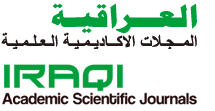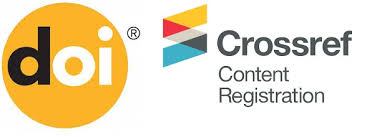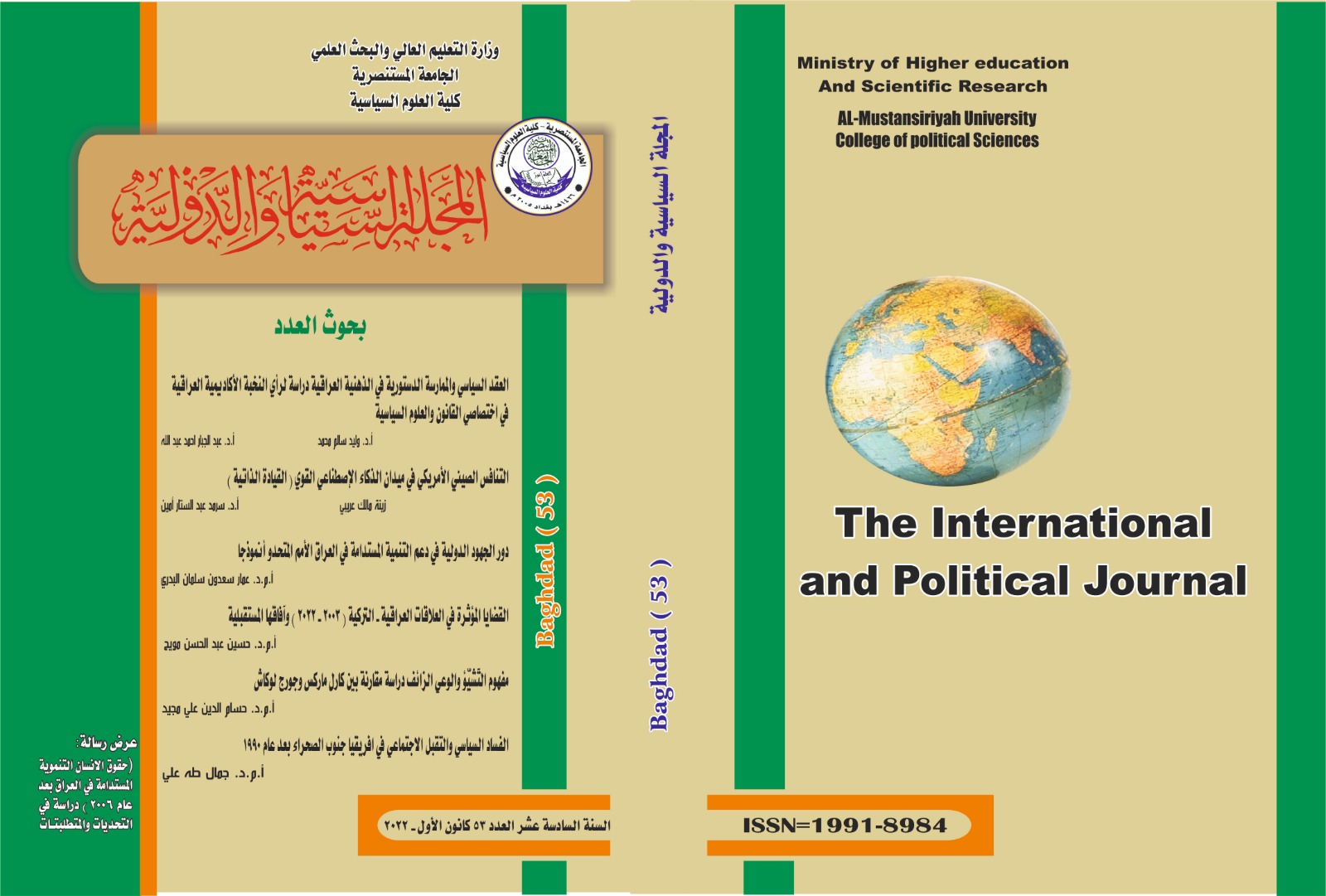Employing American Smart Power in the Middle East
DOI:
https://doi.org/10.31272/ipj.i56.245Keywords:
Smart Power, Americans, Region, Middle EastAbstract
The United States of America is one of the most influential countries in international politics since the end of World War II until today. The reason for this is its clear superiority in using hard power in its foreign policy. American soft power did not play a major role in the policies of hegemony that the Americans followed at the international level for many decades. However, the major changes witnessed in the global arena after the end of the Cold War and the emergence of new major powers on the international scene made the United States reconsider its absolute dependence on its hard power. After the US wars in Afghanistan (2001) and Iraq (2003), American decision-makers reached a firm conviction to diversify the sources of their power. This conviction centered on the necessity of combining hard and soft powers into one force, which was called smart power. Through its use of smart power, the United States seeks to continue its leadership of the global system and impose its will on the international arena despite its many competitors.
References
بكر، علي بشار. 2013. الفوضى الخلاقة: العصف الرمزي لحرائق الشرق الأوسط. بغداد: مركز حمورابي للبحوث والدراسات الاستراتيجية.
جوزيف، ناي اس. 2007. القوة الناعمة وسيلة النجاح في السياسة الدولية. ترجمة محمد توفيق. الرياض: مكتبة العبيكان.
سليمان، يمنى. 2016. القوة الذكية: المفهوم والابعاد، دراسة تأصيلية. إسطنبول: المعهد المصري للدراسات السياسية والاستراتيجية.
صقر، عبد العزيز. 2003. القوة في الفكر الاستراتيجي. المملكة العربية السعودية: تقرير المنتدى الإسلامي، العدد 1. 224.
عبد السلام، رفيق. 2011. الولايات المتحدة بين القوة الصلبة والقوة الناعمة. بيروت: دار الانتشار العربي.
عبد الفتاح، بشير. 2008. القوة العسكرية وحسم الصراعات- الولايات الامريكية نموذجا. القاهرة: المركز العربي للدراسات الإنسانية.
عبد الفتاح، بشير. 2013. ازمة الهيمنة الامريكية. القاهرة: نهضة مصر للطباعة والنشر والتوزيع.
القيسي، محمد وائل. 2016. الأداء الاستراتيجي الأمريكي بعد العام 2008- إدارة أوباما انموذجاً. الرياض: مكتبة العبيكان.
كوكس، مايكل. 2011." القوة الذكية كبديل لثنائية الصلبة والناعمة." مجلة افاق المستقبل، العدد.4: 98.
المعموري، عبد علي كاظم. 2012. عولمة القتل: الحضارة الامريكية الجديدة. بغداد: مركز حمورابي للبحوث الاستراتيجية.
مقبل، ريهام. 2012. "عناصر واشكال القوة في العلاقات الدولية." مجلة السياسة الدولية، عدد. 188: 10.
ناي، جوزيف اس. 2012. مستقبل القوة الامريكية. أبو ظبي: مركز الامارات للدراسات والبحوث الاستراتيجية.
ناي، جوزيف اس. 2015. مستقبل القوة. ترجمة احمد عبد الحميد نافع. القاهرة: المركز القومي للترجمة.
الهاشمي، محمد حميد. 2015. داعش: مقالات في العمق. بغداد: مطبعة الساقي.
المصادر باللغة الانكليزية
Abdel Fattah, Bashir. 2008. [Military power and conflict resolution - the United States of America as a model]. Cairo: Arab Center for Humanistic Studies.
Abdel Fattah, Bashir. 2013. Azmat amercah wa makanteah.[ The crisis of American hegemony]. Cairo: Nahdet Misr for Printing, Publishing and Distribution.
Abdel Salam, Rafiq. 2011. Alwelat almothdea ben alsalbeash wa alnaemah[The United States between hard power and soft power]. Beirut: Arab Publishing House.
Al-Hashemi, Muhammad Hamid. 2015.[ ISIS: In-depth articles]. Baghdad: Al-Saqi Press.
Al-Mamouri, Abdul Ali Kazem. 2012. [The Globalization of Murder: The New American Civilization]. Baghdad: Hammurabi Center for Strategic Research.
Al-Qaisi, Muhammad Wael. 2016. Alestrategeah almreceah wa adaha.[American strategic performance after 2008 - the Obama administration as a mode]l. Riyadh: Obeikan Library.
Bakr, Ali Bashar. 2013. [Creative Chaos: The Symbolic Storm of the Middle East’s Fires]. Baghdad: Hammurabi Center for Research and Strategic Studies.
Cox, Michael. 2011. “Smart Power as an Alternative to the Hard-Soft Dichotomy.” Future Horizons Magazine, Issue 4: 98.
Joseph, Nye S. 2007.[ Soft power is the means to success in international politics]. Translated by Muhammad Tawfiq. Riyadh: Obeikan Library.
Mean, Kathreen. 2017. [The Rise of Smart Power in the Obama Administration: A Comparative Analysis of American Foreign Policy]. Politics and Governance.
Moqbel, Reham. 2012. “Elements and Forms of Power in International Relations.” Journal of International Politics, no. 188:10.
Nye, Joseph S. 2012.mostakbel alqwah almerkeah. [The Future of American Power]. Abu Dhabi: Emirates Center for Strategic Studies and Research.
Nye, Joseph S. 2015.mostkabel alqweah. [The Future of Power]. Translated by Ahmed Abdel Hamid Nafi. Cairo: National Center for Translation.
Nye, Joseph. 2004. Soft Power: The Means to Success in World Politics. New York: Public Affairs.
Quinn, Adam. 2013. “Power in the Obama Administration: A Case Study of the U.S. Response to the Arab Spring." Journal of Strategic Studies 36, No. 1 (February): 73-106.
Saqr, Abdul Aziz. 2003.[ Power in Strategic Thought]. Kingdom of Saudi Arabia: Islamic Forum Report, No. 1. 224.
Suleiman, Yumna. 2016. [Smart power: concept and dimensions, a fundamental study]. Istanbul: Egyptian Institute for Political and Strategic Studies.
Westad, Arne and Samuel Moyn. 2012. [The Smart Power of the United States in Iran: A New Approach to Diplomacy]. New York: Foreign Affairs
Additional Files
Published
How to Cite
Issue
Section
License

This work is licensed under a Creative Commons Attribution 4.0 International License.
Journal Policies
All articles published in the International and Political Journal are licensed under a Creative Commons Attribution 4.0 International License. This means that the Authors can:
The journal allows reuse and remixing of content in accordance with a Creative Commons license.
Copy and redistribute the material in any medium or format.
Policy of publishing in The International and Political Journal
The journal is committed to the ethics of scientific publishing, and according to the publication ethics report of the journal.
The decision to publish is based on the value of the scientific research, to what extent it meets the conditions of publication approved, the declared policy of the journal, and its specialty.
It is based on the principles of the scientific honesty, and originality of research submitted for publication. It deals with the names of reviewers and their reports with great confidentiality.
The opinions published in the journal reflect the views of the authors, and not necessarily reflect the opinion of the editorial board.
The journal does not adhere to the publication of whatever comes to it. The time and place of publication are subject to technical considerations adopted in the editorial plan of the journal.
The journal does not abide to return the research papers to their owners whether accepted for publication or not.
The researcher is to be provided with the acceptance of publication within about 24 WEEKS. As for publication, the editorial board reserves its right in priority of publishing. The arrangement of the research papers in the same issue is subject to technical standards.
Diversify of publishing papers from solid universities and scientific centers from inside and outside Iraq is preferable.
The journal maintains hard copies and electronic archive of the published issues in addition to the publication of the research papers.
The journal also publishes the issues electronically through the website of the journal, and the official website of the Iraqi academic journals, and makes it possible to download. Thus, documenting the intellectual property of the research papers and publishing them internationally is achieved.
Terms of publication may be modified when necessary with no previous notice.
The researcher obtains a copy of his research paper. If he wishes to buy acopy of the journal, the volume costs ID 10000 from inside Iraq and $8from the outside.
The Editorial Board considers that the researcher who submits his research paper for publication in the journal has already read the terms and conditions of publication and agreed on them.
The journal publishes the research papers of the postgraduate students in special issues for this purpose.
Stages of editing and publishing:
The researcher undertakes that his research has never been published before, and has not been submitted for publication to other sides until the end of the evaluation procedures and the acceptance of publication in the journal.
The research papers submitted for publication are to subjected for preliminary examination by the editorial board to determine their suitability for the journal specialization, its policy and the safety of scientific research procedures, and then to indicate its eligibility for scientific evaluation. The editorial board may apologize for accepting the research all together or require the researcher to amend it in accordance with the journal policy before sending it to editors.
After conducting the scientific evaluation, the research paper returns back to the researcher to make the required amendments within a maximum of two weeks.
A copy of the final research paper is to be submitted to the secretariat of the journal a hard copy and a soft copy on a CD, in both Word and PDF format. The researcher is fully responsible for the typing and linguistic mistakes after submitting the full research paper on a CD.
Plagiarism checker
All research papers are subjected to Turnitin program to uncover plagiarism before being sent to scientific evaluation. The researcher undertakes a written pledge to take the legal and moral responsibility, in the event of the emergence of plagiarism or taking from the efforts of other researchers, without a reference to them. The journal uses appropriate anti-plagiarism software, such as Turnitin to check for plagiarism.
Dealing with Allegations of Research Misconduct
The Journal shall take reasonable and serious steps to identify and prevent the publication of papers where research misconduct has occurred, including plagiarism, citation manipulation, and data falsification/fabrication.
Scientific Evaluation:
Scientific evaluation strengthens the research paper submitted to the journal and helps to take the appropriate decision by the editorial board to publish it. It also benefits the researchers to improve and correct their research papers.
The research paper is sent to three evaluators in the same specialty to evaluate












